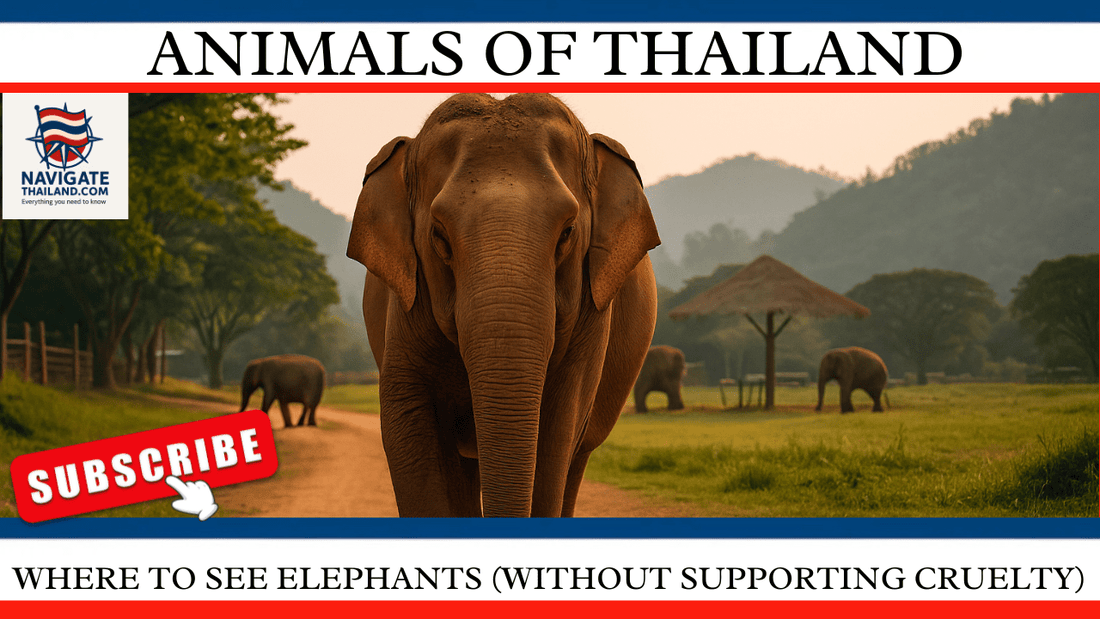
Where to See Elephants (Without Supporting Cruelty) in 2025
Share
Elephants are one of the most revered animals in Thai culture—symbols of strength, wisdom, and heritage. But behind the photo ops and jungle rides, many of these gentle giants are suffering. In 2025, more travellers are choosing ethical experiences that protect elephants rather than exploit them.
This guide shows you where you can see elephants in Thailand without supporting cruelty, with updated recommendations that reflect the highest animal welfare standards.
Why Elephant Tourism Is So Controversial
For decades, elephant tourism has been a major industry in Thailand. From circus-style shows to jungle treks, elephants have been trained—often through painful methods—to entertain tourists. Known as “the crush”, the training process can involve isolation, beatings, and deprivation.
Even camps that claim to be sanctuaries sometimes allow riding or forced interactions. Fortunately, growing awareness has led to a rise in genuine sanctuaries where elephants can live naturally and freely.
What Makes an Elephant Experience Ethical?
In 2025, ethical elephant sanctuaries follow strict no-riding, no-performing, and no-chaining policies. Instead of riding or bathing the elephants, visitors observe them in their natural behavior—feeding, walking, and socializing.
Look for places that:
- Rescue elephants from logging, circuses, or abusive tourism
- Avoid any forced human interaction
- Provide veterinary care and open space
- Are transparent with their funding and mission
Top Ethical Elephant Sanctuaries in Thailand (2025)
1. Elephant Nature Park – Chiang Mai
Arguably the most respected sanctuary in Thailand, Elephant Nature Park has rescued dozens of elephants from abuse. Visitors can walk with them through the jungle, help with feeding, and learn about each elephant’s story.
- Location: 60km north of Chiang Mai
- Ethics: No riding, no chains, rescue-focused
- Bookings: Often sells out months in advance
2. Elephant Hills – Khao Sok National Park
Located in one of the most biodiverse regions in Thailand, Elephant Hills offers an ethical elephant experience paired with luxury glamping. Guests learn about conservation and get to observe elephants from a respectful distance.
- Location: Surat Thani, Southern Thailand
- Ethics: Observation only, no bathing or touching
- Experience: Combine with a jungle canoe or lake safari
3. Boon Lott’s Elephant Sanctuary (BLES) – Sukhothai
A small, deeply personal sanctuary founded by Katherine Connor in memory of a baby elephant named Boon Lott. BLES offers immersive multi-day visits where guests live on-site and walk through the forest with rescued elephants.
- Location: Northern Central Thailand
- Ethics: Very limited tourism, high standards
- Ideal for: Serious conservation-focused travellers
4. Phuket Elephant Sanctuary – Phuket
Phuket is notorious for elephant shows and rides, but this sanctuary is turning the tide. Set in a lush jungle, the sanctuary lets rescued elephants roam freely while visitors watch from elevated walkways.
- Location: East Phuket
- Ethics: Strictly no touching, supports retired working elephants
- Bonus: Educational center and eco-pool
5. Wildlife Friends Foundation Thailand (WFFT) – Phetchaburi
WFFT rescues not only elephants but also gibbons, bears, and other abused wildlife. The sanctuary offers guided tours and even multi-day volunteer programs where you can help prepare food and observe their natural behavior.
- Location: 3 hours from Bangkok
- Ethics: Multispecies rescue center, no riding or bathing
- Unique factor: Holistic animal welfare model
What to Avoid
In 2025, many tourist traps still exist. Be cautious of places that:
- Allow elephant rides
- Let you bathe elephants (this forces interaction and often stresses them)
- Use bullhooks or chains
- Market themselves as sanctuaries but offer circus-style performances
If you’re unsure, a good rule of thumb is: if an elephant is performing or being touched by tourists, it’s likely unethical.
Tips for Visiting Ethically
- Book in advance – Ethical sanctuaries often have limited numbers to protect the animals.
- Do your research – Read recent reviews, and check if the sanctuary is endorsed by credible wildlife organizations.
- Spread the word – Share your ethical experiences to help educate others.
Conclusion
In 2025, Thailand offers more opportunities than ever to connect with elephants in a way that respects their wellbeing. By choosing ethical sanctuaries, you’re not just getting a meaningful experience—you’re actively contributing to the protection of Thailand’s national treasure.
If you’ve visited one of these sanctuaries, or discovered another cruelty-free experience, let us know in the comments! And don’t forget to share this blog with fellow animal lovers and subscribe to our Navigate Thailand YouTube Channel for immersive travel stories from the Land of Smiles.
References:
- Save Elephant Foundation, 2025
- World Animal Protection, Thailand Reports 2025
- Ethical Elephant Sanctuaries Thailand (NGO report, 2024–2025)
- TripAdvisor Ethical Wildlife Tourism Forum
Read more of our Thailand blog series:
Thai Food Guide:Traditional Recipes and Street Eats
Everything Travellers Need to know
Thailand travel ebooks and language guides
Thailand Travel Apparel & Souvenir Gifts
Subscribe to our YouTube channel Navigate Thailand to see our most popular Thailand travel blogs turned into videos:










































































































































